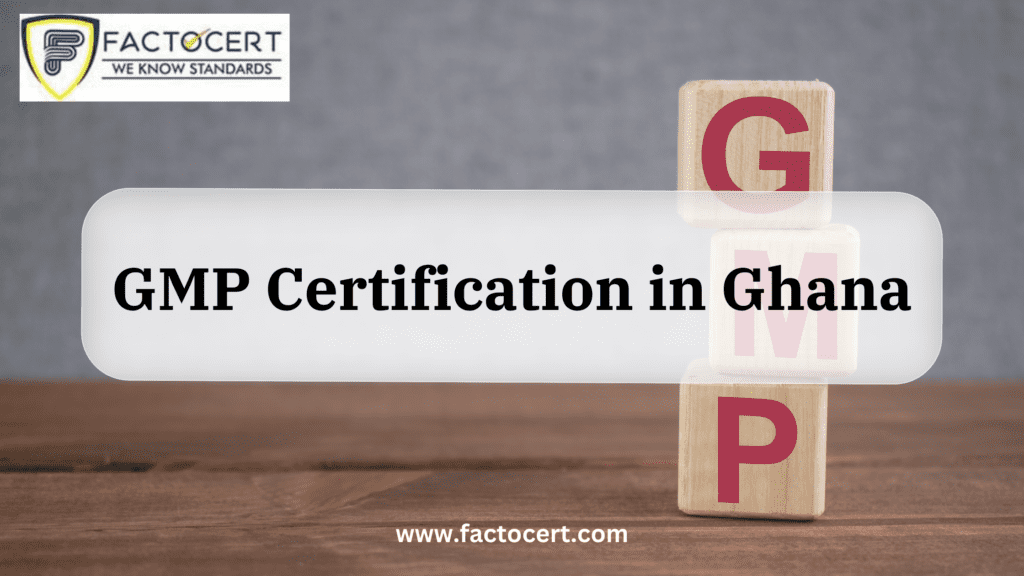GMP Certification ensures that items are safe and of good quality is very important. A company’s Good Manufacturing Practice (GMP) Certification shows it is dedicated to making products that meet strict quality standards. In this blog post, we will talk about what GMP Certification means and give you a step-by-step plan on how to get it in Ghana.
How to Get GMP Certification: What Is GMP?
Good Manufacturing Practice, or GMP, is a set of rules and standards to ensure that goods are always safe, effective, and of high quality. GMP Certification is an official sign that a business follows these rules. It reassures customers, regulators, and business partners that the goods are made in a controlled and standardised environment.
Why GMP Certification Is Important:
People trust GMP Certification because it lets them know that the goods they buy are up to strict quality standards.
Regulatory Compliance: To ensure the safety of goods on sale, many countries, including Ghana, require companies to follow GMP guidelines.
Market Access: GMP Certification makes it easier for businesses to get into new markets by meeting the standards set by foreign regulatory bodies. This lets them fight on a global scale.
How to Get GMP Certified in Ghana:
Step 1: Learn What GMP Needs
Learning about the GMP standards that apply to your business is very important before you start the Certification process. If you make medicines, food, makeup, or medical gadgets, these rules may differ from those that apply to other products.
Step 2: Put together a GMP compliance team
Make a team within your company responsible for following and handling GMP standards. People on this team should have experience with quality control, industry, and government regulations.
Step 3: Analyse the GMP gaps.
Compare your present manufacturing methods to GMP standards to find places where they don’t meet the requirements. This gap study will help you make a plan for making the changes that need to be made.
Step 4: Put GMP standards into place
Fill in the gaps found by the research by making changes to how you make things, how your building is set up, how you train your staff, and how you keep records. Make sure that all parts of the production meet GMP standards.
Step 5: Write down your standard operating procedures (SOPs).
Write down Standard Operating Procedures (SOPs) for every part of your manufacturing process. SOPs are used as a guide by workers and spell out the exact steps that need to be taken to ensure consistency and compliance.
Step 6: Train your employees
Stress to your workers how important it is to follow the new SOPs when you train them on them. Make sure that your employees know what the rules are and can follow them.
7th Step: Do internal audits
Do regular internal checks to see how well your GMP programme is working. Find places that might need more work and fix problems that need to follow the rules.
Step 8: Pick a Certification Body
Choose a Certification group with a good reputation and is recognized by the proper officials in Ghana. The Certification group will check to see if you follow GMP guidelines and give you the certificate if you do.
Step 9: Send in your application
Send an application for GMP Certification to the licensing group you’ve picked. Include all the necessary paperwork, like SOPs, records of internal checks, and proof that GMPs were followed.
Step 10: Check the site
Get ready for the Certification group to do a check on-site. Auditors will look at your facility, methods, and paperwork during the review to make sure they fully meet GMP standards.
Step 11: Giving out the Certification
The Certification body will give you GMP Certification once the on-site review is done successfully. This shows that you are committed to using quality production practices.
Why choose Factocert for GMP Certification in Ghana?
Are you seeking GMP Certification in Ghana? Factocert is a significant GMP Certification Bodies in Ghana, providing GMP Consultants in Ghana and with offices in Accra, Kumasi, Tema, Tamale, Cape Coast, and other important cities. We provide a variety of ISO Standards at discounted prices, including ISO 27001, ISO 9001, GDP, GLP,GMP, SA 8000 Halal, ISO 17025, ISO 14001, ISO 22000, and others. For further information, please visit www.factocert.com or contact us at contact@factocert.com
Conclusion:
GMP Certification shows that a business is serious about making safe, high-quality goods. Companies in Ghana that want to get GMP Certification must follow a structured method of compliance, paperwork, and Certification. Companies can confidently get GMP Certification by learning about the requirements, setting up a dedicated compliance team, and working with reputable Certification bodies. This way, they can ensure that their goods meet international standards and can fight globally.
For More information visit : GMP Certification in Ghana





